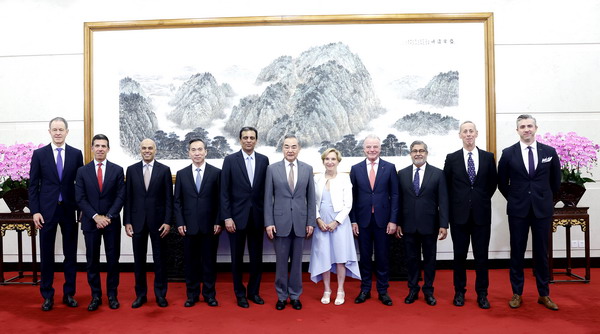American businesses reaffirm remaining commitment to China market during visit after key meeting

American businesses reaffirmed their commitment to the China market, their major trading partner, during their visit to China with a large delegation.
Despite the challenges and complexity in the bilateral relations, the visit of the American industry representatives, immediately in the wake of the Third Plenary Session of the 20th Central Committee of the Communist Party of China, showcased the foreign companies' eagerness to understand more about the important policies released from the meeting, as well as the fact that two countries' economic and trade ties will stay resilient despite certain "decoupling" attempts from the US government, Chinese experts said.
The delegation led by Raj Subramaniam, board chair of the US-China Business Council (USCBC), had opportunities for face-to-face talks with Chinese Vice Premier He Lifeng, and other senior officials such as the Minister of Foreign Affairs Wang Yi and the Minister of Commerce Wang Wentao earlier this week, during which both sides exchanged views on many key subjects of concerns.
Roberta Lipson, founder of United Family Healthcare and Vice-Chair of the American Chamber of Commerce in China, who also participated in the meetings as a member of the delegation, told the Global Times on Thursday that the face-to-face discussions during the visit helped to build confidence.
Every year the board of directors of the USCBC sends a high-level delegation of executives to give feedback, exchange ideas and learn from the leadership of China's government. Lipson said that the US-China relationship has had its challenges over the last few years, exacerbated by the lack of contact and dialog during the COVID pandemic.
"Although both government-to-government and people-to-people contacts have been recovering and growing for the past year and a half, the challenges of the post-pandemic economic recovery, as well as competitive, strategic and security issues continue to make for uncertainty," she noted.
Despite these vicissitudes in the relationship, Lipson said that business has continued to work on trade and investment, which creates jobs, improves quality of life and prosperity for both countries. "The face-to-face discussions of this visit helped to build confidence," she noted.
To Lipson, this visit comes at an opportune time, immediately after the third plenum, which outlines the development strategy for China over the next five years.
"Our visit at this time was a unique opportunity to hear directly from China's leadership about the third plenum's plans for strategic development; including a continued commitment to reform and opening-up, evening the playing field for the private market and SOEs, and increasing market access for foreign investment," Lipson said.
The delegation also had the opportunity to give feedback about challenges they were facing in their business. This, Lipson said, "along with the warm reception of our hosts, all have served to increase the confidence of the visiting executives."
In a meeting with the delegation led by Subramaniam on Tuesday, China's Commerce Minister Wang Wentao noted that China will continue to open up, and welcome enterprises from all over the world, including those from the US, to continue to explore the China market and share development opportunities.
Subramaniam said in the meeting with Wang that China has sent a positive signal to the world to further deepen reform and expand opening-up, which has enhanced market confidence, according to the Ministry of Commerce.
Economic and trade cooperation is a stabilizing force for bilateral relations. Subramaniam said that the USCBC and its member companies support the expansion of economic and trade cooperation between the two countries and will continue to be committed to long-term development in China.
"The visit of such a large delegation of the US businesses to China reflects the fact that many American companies are still hoping to maintain close relations with China, their major trading partner, in order to better secure their business interest," He Weiwen, a senior fellow from the Center for China and Globalization, told the Global Times in recent interview.
Their visit once again demonstrated that they attached great importance to the China market and that the two countries will not and cannot "decouple" from each other, He said.